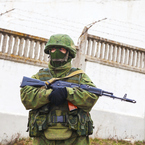Paul R. Gregory
Paul Gregory is a research fellow at the Hoover Institution. He holds an endowed professorship in the Department of Economics at the University of Houston, Texas, is a research professor at the German Institute for Economic Research in Berlin, and is emeritus chair of the International Advisory Board of the Kiev School of Economics. Gregory has held visiting teaching appointments at Moscow State University, Viadrina University, and the Free University of Berlin. He blogs on national and international economic topics at http://www.forbes.com/sites/paulroderickgregory/ and http://paulgregorysblog.blogspot.com/.
The holder of a PhD in economics from Harvard University, he is the author or coauthor of twelve books and more than one hundred articles on economic history, the Soviet economy, transition economies, comparative economics, and economic demography. Gregory’s economics papers have been published in American Economic Review, Econometrica, Quarterly Journal of Economics, Review of Economics and Statistics, Journal of Political Economy, Journal of Economic History, and the Journal of Comparative Economics. His most recent books are Women of the Gulag: Portraits of Five Remarkable Lives (Hoover Institution Press, 2013), Politics, Murder, and Love in Stalin's Kremlin: The Story of Nikolai Bukharin and Anna Larina (Hoover Institution Press, 2010), Lenin’s Brain and Other Tales from the Secret Soviet Archives (Hoover Institution Press, 2008), Terror by Quota (Yale, 2009), and The Political Economy of Stalinism (Cambridge, 2004), which won the Hewett Prize. He edited The Lost Transcripts of the Politburo (Yale, 2008), Behind the Façade of Stalin's Command Economy (Hoover, 2001), and The Economics of Forced Labor: The Soviet Gulag (Hoover, 2003). The work of his Hoover Soviet Archives Research Project team is summarized in "Allocation under Dictatorship: Research in Stalin's Archive" (coauthored with Hoover fellow Mark Harrison), published in the Journal of Economic Literature.
Gregory has also published The Global Economy and Its Economic Systems (Cengage, 2013) and is working with director Marianna Yarovskaya on a film documentary entitled Women of the Gulag.
Gregory also served on the editorial board of the seven-volume Gulag documentary series entitled The History of the Stalin Gulag, published jointly by the Hoover Institution and the Russian Archival Service. He also serves or has served on the editorial boards of Comparative Economic Studies, Slavic Review, Journal of Comparative Economics, Problems of Post-Communism, and Explorations in Economic History.
His research papers are available at the Hoover Institution Archives.










